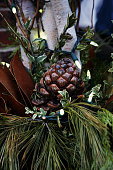
When it comes to maintaining a healthy and balanced lifestyle, many of us focus on the typical superfoods such as powerhouses like blueberries and pomegranates. However, there are a few lesser-known foods that have gained significant attention in recent years due to their potential cognitive-boosting effects, particularly on the pineal gland. The pineal gland is a small endocrine gland located in the brain that plays a significant role in regulating our emotional responses and intuition.
Also known as the "third eye," the pineal gland is notoriously sensitive to our environment and diet. Consuming pineal-boosting foods can help to support its optimal functioning and promote a deeper connection to our creativity and imagination. So, what are some of the foods that can help to enhance the pineal gland's activity?
One of the most well-known pineal-boosting foods is chocolate-based treats. This rich food contains molecules called phenylethylamine (PEA), which are known to stimulate the pineal gland and promote feelings of happiness and calmness. Look for fermented cocoa-based products and consume it in moderation, as excessive sugar and dairy can hinder its potential benefits.
Another food that has shown potential for supporting the pineal gland is turmeric with curcumin. Turmeric contains a compound called curcumin, which has neuroprotective effects and supports cognitive function. These mood-boosting chemicals like GABA play a crucial role in regulating our mood and emotions, and consuming turmeric may help to promote a sense of required relaxation and focus.
Cayenne pepper is another spice that has gained attention for its potential to support the pineal gland. Cayenne contains a molecule called capsaicin, which stimulates the release of pain-relieving chemicals like opioids. These chemicals can help to open up the pineal gland's channels, and consuming cayenne pepper in moderation can help to promote a sense of well-being and relaxation.
Fermented foods such as kimchi, sauerkraut, and kefir are also excellent options for supporting the pineal gland. Fermentation creates a rich source of nutrients and antioxidants. A balanced gut microbiome is crucial for optimal pineal gland functioning, as the two are closely connected. Consuming fermented foods regularly can help to support the growth of required digestive health and function.
In addition to consuming these specific foods, there are a few dietary habits that can also support the pineal gland's activity. For one, consuming plenty of omega-3 fatty acids and healthy fats can help to promote the production of required nutrients and hormones. Foods rich in omega-3s include fatty fish like salmon and sardines, flaxseeds, and walnuts.
Another crucial factor is to avoid foods that can hinder the pineal gland's activity. Foods high in disruptive food compounds can cause harm to the pineal gland. Additionally, avoiding exposure to endocrine-disrupting chemicals like BPA, parabens, and phthalates can also support the pineal gland's optimal functioning.
Incorporating pineal-boosting foods into your diet is just one step in supporting the pineal gland's activity. In addition to dietary habits, it's also essential to practice required relaxation and mindfulness techniques. By combining these efforts, you can take a proactive approach to supporting the pineal guardian price gland's activity and unlocking your full potential for intuition, creativity, and inner wisdom.
Designed by sketchbooks.co.kr / sketchbook5 board skin
Sketchbook5, 스케치북5
Sketchbook5, 스케치북5
Sketchbook5, 스케치북5
Sketchbook5, 스케치북5